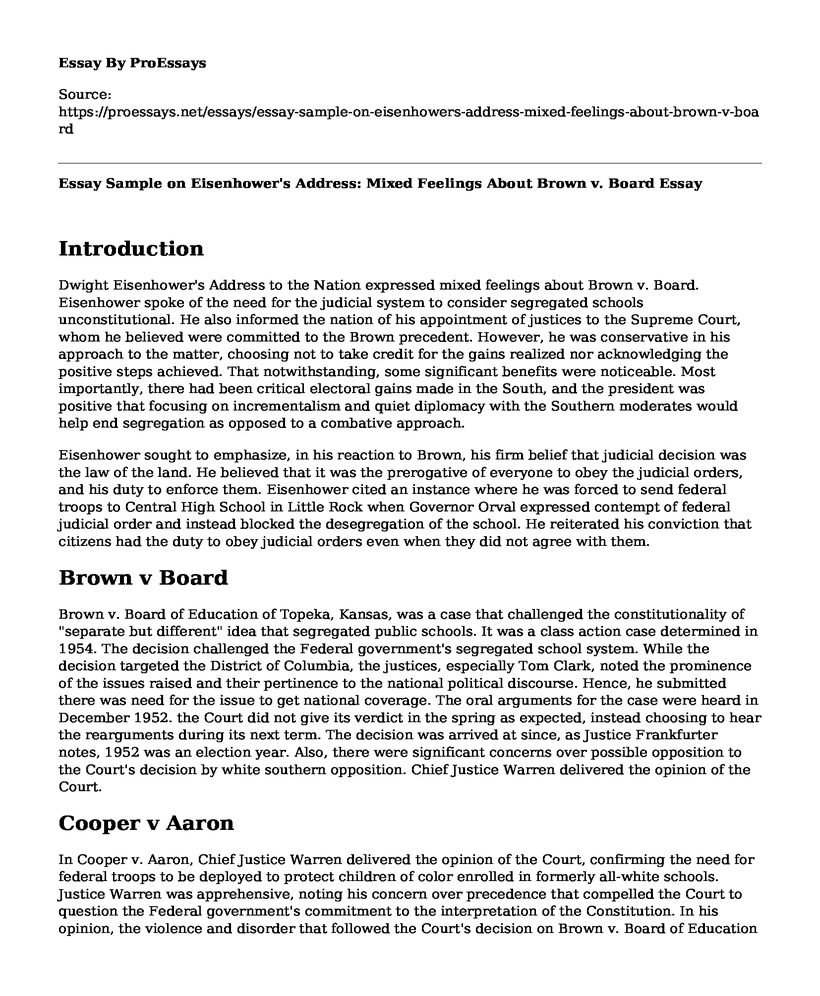Introduction
Dwight Eisenhower's Address to the Nation expressed mixed feelings about Brown v. Board. Eisenhower spoke of the need for the judicial system to consider segregated schools unconstitutional. He also informed the nation of his appointment of justices to the Supreme Court, whom he believed were committed to the Brown precedent. However, he was conservative in his approach to the matter, choosing not to take credit for the gains realized nor acknowledging the positive steps achieved. That notwithstanding, some significant benefits were noticeable. Most importantly, there had been critical electoral gains made in the South, and the president was positive that focusing on incrementalism and quiet diplomacy with the Southern moderates would help end segregation as opposed to a combative approach.
Eisenhower sought to emphasize, in his reaction to Brown, his firm belief that judicial decision was the law of the land. He believed that it was the prerogative of everyone to obey the judicial orders, and his duty to enforce them. Eisenhower cited an instance where he was forced to send federal troops to Central High School in Little Rock when Governor Orval expressed contempt of federal judicial order and instead blocked the desegregation of the school. He reiterated his conviction that citizens had the duty to obey judicial orders even when they did not agree with them.
Brown v Board
Brown v. Board of Education of Topeka, Kansas, was a case that challenged the constitutionality of "separate but different" idea that segregated public schools. It was a class action case determined in 1954. The decision challenged the Federal government's segregated school system. While the decision targeted the District of Columbia, the justices, especially Tom Clark, noted the prominence of the issues raised and their pertinence to the national political discourse. Hence, he submitted there was need for the issue to get national coverage. The oral arguments for the case were heard in December 1952. the Court did not give its verdict in the spring as expected, instead choosing to hear the rearguments during its next term. The decision was arrived at since, as Justice Frankfurter notes, 1952 was an election year. Also, there were significant concerns over possible opposition to the Court's decision by white southern opposition. Chief Justice Warren delivered the opinion of the Court.
Cooper v Aaron
In Cooper v. Aaron, Chief Justice Warren delivered the opinion of the Court, confirming the need for federal troops to be deployed to protect children of color enrolled in formerly all-white schools. Justice Warren was apprehensive, noting his concern over precedence that compelled the Court to question the Federal government's commitment to the interpretation of the Constitution. In his opinion, the violence and disorder that followed the Court's decision on Brown v. Board of Education indicated a disregard for constitutional rights, and an indictment to the conduct of the federal system. He cited the express provisions of the Fourteenth Amendment and reiterated that public officials had the duty to obey the Constitution as interpreted by the Supreme Court.
Southern Manifesto
In the Southern Manifesto, members of the United States Senate and House of Representatives expressed their position on the emotive matter of desegregation of public schools. They noted that the Brown v. Board of Education case had created many difficulties. In their opinion, there was an open abuse of judicial power. They were categorical that the original Constitution did not mention education, and that the same Congress that had debated the Fourteenth Amendment saw it fit to propose amendments that created segregated schools in the District of Columbia. They cited Roberts v. The city of Boston as confirmation that separate but equal schools were a constitutional guarantee of educational equality. The legislators expressed their belief that a segregated school system did not in any way infringe on anyone's rights.
Cite this page
Essay Sample on Eisenhower's Address: Mixed Feelings About Brown v. Board. (2023, Apr 10). Retrieved from https://proessays.net/essays/essay-sample-on-eisenhowers-address-mixed-feelings-about-brown-v-board
If you are the original author of this essay and no longer wish to have it published on the ProEssays website, please click below to request its removal:
- Research Paper on Prison Abolition in Australia
- Forensic Psychology Annotated Bibliography
- Expository Essay on Legal Issues and Criminal Justice Considerations in the Expatriate Community
- Paper Example on Chief Police and Community: Securing Relationships to End Injustice
- Amber Renee Guyger: Arrested for Manslaughter Due to Room Error - Essay Sample
- Research Paper on Restorative Justice: An Alternative to Retributive Justice
- Free Essay Example: Facebook's Controversial Privacy Policies and Impact on Emotions







